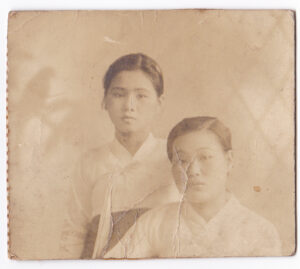감각이상 포폴 2 ver
*Scroll down to KO ver. ↓
My clumsy grandma,
from a place nearby to a distance ―
My maternal grandmother was the youngest daughter of a family of Oriental medicine practitioners for Koreans on the outskirts of Hiroshima. At the age of eighteen she met my maternal grandfather who had been taken to Japan as a forced laborer. With the Pacific War nearing its end, the region surrounding Japan was extremely unstable. In 1944, my maternal grandfather crossed the sea and fled to Busan with my maternal grandmother, then pregnant with their first child. She had left her family behind in Japan and had just started a new life in Busan. In the following year, pregnant with their second child, she heard the news that ‘a big bomb had been dropped in Hiroshima.’ People said half of the city had disappeared because of a single bomb. All contact with her family in Japan had been cut off. 28 years later, in 1978, my grandmother’s second older brother, her family’s sole surviving member following the Hiroshima atomic bomb, came to find her in Busan. People later called him ‘Hibakusha’ (victim of the atomic bomb). He never had any children. I remember that my grandmother’s Korean was still somewhat awkward.

(왼) 故석착향-외할머니, 히로시마, 1941
(left) 故 Seokjak hyang-Maternal grandmother, Hiroshima, 1941
In the fall of 2017, the daily news was bombarded with sensational reporting on nuclear arms and radiation following North Korea’s successful sixth nuclear test. This event was unlike any other war in history that I had been taught. Throughout my life, neither school nor society had exposed me to information about the impacts of the atomic bomb. My understanding was limited to baseless fear of nuclear weapons. On TV, never-ending arrays of missiles were soaring through the sky. With the atomic bomb, we only see its cruel results, not its process. Rather than questioning the war itself, my personal experiences led me to be interested in the people that had experienced and survived war, and the post-war state. These people have been molded, not by their own volition, but by the macro-level forces of war, colonialism, forced conscription and migration. What I realized through my work was that this single-day event that took place more than 75 years ago across the sea, inconveniently yet effectively exerts its influence on our society to this day, as well as on the future generations in unforeseeable ways.
〈Abnormal Sense〉 work has begun from my family history. It is also our history which hasn’t been properly spotlighted.
* “Abnormal sense” is a medical lexicon, which refers to all types of abnormal sensation in the sensory areas or lack of sensory experiences. When a stimulus from our environment is detected by a sensory receptor, including the external and the internal senses, the nerve fibers relay that sensory information to the sensory area in the cerebral cortex through the nerve fibers: and sensation has occurred. ‘Abnormal sense’ thus refers to the situation of the marginalized people looking back at the tragic history as well as the changes that I went through after meeting them.
―Abnomal Sens, Hyoyeon Kim Photo Book page
나의 서툰 할머니,
가장 가까운 곳에서 먼 곳으로 ―
외할머니는 히로시마 외곽지역에서 조선인을 상대로 한의원을 하던 집의 막내딸로 태어났다. 그리고 열여덟 살이 될 무렵 일본에 징용되어있던 외할아버지를 만났다. 당시 일본 주위 정세는 태평양 전쟁이 막바지로 치달으며 극도로 불안했다. 1944년 외할아버지는 첫 아이를 임신한 열 여덟살의 외할머니를 데리고 바다를 건너 부산으로 피난을 왔다. 가족을 일본에 남겨두고 남편과 부산에서 새로운 삶을 꾸려가던 할머니는 두 번째 아이를 임신 중이던 이듬해에 ‘히로시마에 큰 폭탄이 떨어졌다’ 는 소식을 듣게 되었다. 사람들은 폭탄 한 번으로 도시의 절반이 사라졌다고 했다. 일본에 살던 가족과 모든 연락은 끊겼다. 그로부터 28년이 지난 1973년, 원폭에서 홀로 살아남은 할머니의 작은 오빠는 부산으로 여동생을 찾아왔다. 후에 사람들은 작은 할아버지를 ‘히바쿠샤(Hibakusha/ 피폭자)’라 불렀다. 작은 할아버지는 평생 아이를 갖지 않으셨다. 그리고 내 기억 속의 할머니는 여전히 한국말이 조금 서툴렀다.
2017년 가을, 뉴스에서는 북한이 6차 핵실험에 성공하며 핵무기와 방사능, 전쟁 발발 가능성에 대한 자극적인 보도가 연일 넘쳐났다. 하지만 다른 전쟁과는 달랐다. 학교와 사회를 거치는 동안 핵무기에 대한 막연한 두려움 외엔 원폭 피해에 관한 어떠한 정보도 제대로 접해본 경험이 없었다. 화면에서는 수 발의 미사일들이 쉴 새 없이 하늘로 날아올랐다. 과정이 없는 잔인한 결과였다. 나의 개인적 경험은 전쟁 그 자체보다 과정에 속한 사람들과 사건의 종결 후, 현재 상황에 대한 의문을 품게 만들었다. 그들은 전쟁-식민지, 징용-이주의 큰 굴레에서 본인의 의지와는 무관하게 대부분 타의로 생겨난 사람들이었다. 그 간의 작업에서 확실하게 알게 된 것은 75여 년 전 바다를 건너 하루에 벌어진 사건은 지금에도, 먼 미래의 아이들에게도 불특정하게 대를 이어 불편하고 유효한 영향력을 여전히 행사한다는 사실이었다.
〈감각이상〉 작업은 한 가족의 역사에서 시작되었다. 그리고 그것은 아직 제대로 조명 받지 못한 우리의 역사이기도 하다.
* ‘감각이상’ 은 사전적 의학용어로 내부 감각 등의 감각영역의 이상 경험 혹은 경험의 결핍, 자극에 의해 생긴 감각수용기의 흥분이 구심성 신경을 통하여 대뇌피질 감각 영역에 전달되어 의식된 경험의 감각이다. 정상적이지 않은 감각 모두를 이른다. 아픈 역사를 바라봄에서 소외되었던 그들의 상황과 내가 그들을 만나 겪었던 변화를 표현하고자 했다.

Leave a comment